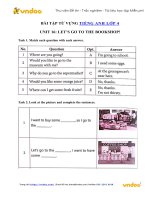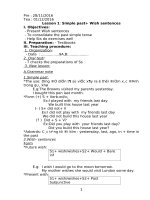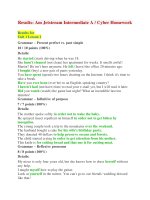Speakout pre intermediate 2nd student book
Bạn đang xem bản rút gọn của tài liệu. Xem và tải ngay bản đầy đủ của tài liệu tại đây (895.17 KB, 70 trang )
Pre-intermediate Lead-in audio script
LEAD-IN
Recording 1
1
would – as in ‘would you like a drink?’
would. w-o-u-l-d
2
which – as in ‘which film did you see?’
which. w-h-i-c-h
3
friend – as in ‘what is the name of your best friend?’
friend. f-r-i-e-n-d
4
know – as in ‘do you know the answer?’ know. k-n-o-w
5
people – as in ‘how many people are in your class?’
people. p-e-o-p-l-e
PHOTOCOPIABLE © Pearson Education Limited 2015
Pre-intermediate Unit 1 audio script
UNIT 1
Recording 1
1
How many people are in your family?
2
How often do you see your parents?
3
Do you enjoy spending time with your family?
4
When was your last family celebration?
5
Who do you live with?
6
How often do you eat out with friends?
7
Where does your best friend live?
UNIT 1
Recording 2
W1 = 1st woman
M = Man
W2 = 2nd woman
Story 1
W1:
My boyfriend and I were at a restaurant and I don’t know how he did it,
but he put the engagement ring in my salad. I didn’t see it and I put it in
my mouth. I think he panicked and tried to stop me. Anyway, luckily I
felt something hard as I bit into my food and I didn’t swallow it. I took it
out, saw what it was and accepted! So that was how we got engaged.
It was almost a disaster. We got married one month later.
Story 2
M:
We decided to go on holiday in Egypt as we both liked diving. This was
me and my girlfriend at the time. So we went on a dive and I proposed
to her underwater. I didn’t say anything. I just gave her the ring while
we were, I don’t know, ten feet under. Luckily, she smiled. We got back
on the boat and she said yes.
PHOTOCOPIABLE © Pearson Education Limited 2015
Pre-intermediate Unit 1 audio script
Story 3
W2:
My husband and I are video artists. We met at art school and honestly
we fell in love immediately. And what he did was he made a funny 2minute video, he put it on YouTube and sent a link to me. And it was
him proposing. And in the video there was music and then all of our
friends suddenly appeared, singing and dancing. It was amazing and
such a surprise. I watched it and then I surprised him. I accepted his
proposal, but I didn’t tell him. Instead I made a video of me saying yes.
UNIT 1
Recording 3
1
/d/
lived
They lived in Africa.
asked
He asked her to marry him.
started
They started a family.
2
/t/
3
/Id/
UNIT 1
Recording 4
worked
wanted
stopped
smiled
walked
needed
talked
studied
helped
decided
PHOTOCOPIABLE © Pearson Education Limited 2015
Pre-intermediate Unit 1 audio script
UNIT 1
Recording 5
W1 = 1st woman
D = Davide
R = Rachel
W2 = 2nd woman
F = Felicia
Conversation 1
W1:
Hi, Davide. This is my friend, Rachel.
D:
Hi, Rachel. Pleased to meet you. [pause] Would you like a drink?
R:
Sorry. What did you say?
D:
Would you like a drink, Rachel?
R:
Oh. I’d love a coffee, thank you.
D:
So, do you work here?
R:
No, I’m a student.
D:
Are you here on holiday then?
R:
Er … yes.
D:
Where exactly do you come from?
R:
I’m from Beckley, near Oxford.
D:
OK, er, I’ll just go and get the coffee.
Conversation 2
W2:
Hi, Felicia. Nice day, isn’t it?
F:
Yes, it’s lovely.
W2:
Did you have a good weekend?
F:
Yes, it was OK. I didn’t do much.
W2:
Did you watch the match last night?
F:
Yes, it was terrible. We lost 3-0.
W2:
Oh no! I’m sorry to hear that.
F:
That’s OK. I’ll see you later.
W2:
Yes, see you soon.
UNIT 1
Recording 6
1
Would you like a drink?
2
Did you have a good weekend?
PHOTOCOPIABLE © Pearson Education Limited 2015
Pre-intermediate Unit 1 audio script
3
This is my friend Rachel.
4
I’d love a coffee, thank you.
5
Yes it was OK.
6
Please to meet you.
UNIT 1
Recording 7
I’ve known Michelle for a long time and we met when we were at school
together. We were about eleven years old and I had to show her to her peg to
hang up her coat and we’ve been mates ever since. Er … we get on really
well. She’s one of those people that if you haven’t seen [them] for six months,
six days, it’s the same. It’s like time hasn’t passed. We’ve got lots of things in
common. We play tennis together. The only problem with Michelle is that
she’s a bit competitive and we’ve fallen out over tennis. Sometimes if she
wins, I haven’t spoken to her … erm … and she’s just one of those people you
can rely on. She’s sort of like number one in my phone book. Erm … and yes,
she’s a great person. We have a real laugh together.
PHOTOCOPIABLE © Pearson Education Limited 2015
Pre-intermediate Unit 2 audio script
UNIT 2
Recording 1
company
employee
salary
office
customer
employer
staff
task
boss
bonus
UNIT 2
M = Man
M:
Recording 2
W = Woman
Today we’re looking at how companies motivate their staff. Sarah, can
you tell us more?
W:
Absolutely. Internet companies are famous for this type of thing. At
Yahoo there’s a free bus ride to work for employees. There’s also a
dentist and a hairdresser at the office.
M:
Makes life easier for employees …
W:
Exactly. And, wait for it, one day a month the staff watch films together.
M:
Great ideas.
W:
Yep. Now at Google, lunch is free, and you can also get a cheap
massage at the office.
M:
Wow.
W:
And other companies are bringing in new ideas, too. A company called
Pontiflex in New York created a nap room, where employees could
sleep for 15 minutes.
M:
Nice idea.
W:
At several companies we’re hearing that the relationship between
bosses and employees is changing. At one company, the boss writes
thank you notes to employees. At another, the staff does a job swap
PHOTOCOPIABLE © Pearson Education Limited 2015
Pre-intermediate Unit 2 audio script
two days a year. So a senior manager might clean floors for the day,
and the cleaner can sit in an air-conditioned office.
M:
Does that motivate everybody?
W:
Well, it helps employees to see what everyone else is doing in the
company, which I think is … very valuable and of course ….
UNIT 2
Recording 3
I = Interviewer
M = Man
W = Woman
E = Employee
Conversation 1
M:
Hi. I work at Kinko’s coffee shop across the street. But, er, at the
moment I’m having a break here in the music shop.
I:
And what are you doing on your break?
M:
I’m choosing my free CD for the week.
I:
Free CD? Can you tell us a bit more? Why are you doing this?
M:
Sure. Kinko’s, the coffee shop, has an agreement with the music shop.
The employees at the music shop get free coffee at Kinko’s. They all
come in during their break. And we get one free CD a week from the
music shop.
I:
Great!
M:
We all know each other and it works really well.
Conversation 2
W:
So, this is the clothes shop. And this is the study area.
I:
Right. So you have a study area?
W:
Yeah. As you can see, David, over there, is studying. And these two
are doing an online course.
I:
And this is during company hours? Does the boss know about this?
W:
It’s the boss’ idea. The company pays for employees to do courses. So
during our breaks or after seven when the shop closes, we can stay on
and study.
I:
That’s excellent. And are you studying at the moment?
W:
Yeah, but I’m not studying anything connected with fashion.
I:
What are you studying?
PHOTOCOPIABLE © Pearson Education Limited 2015
Pre-intermediate Unit 2 audio script
W:
I’m studying history.
I:
And the company pays?
W:
The company pays. It pays for about six of us. I think six of us are
doing online courses.
I:
Brilliant.
Conversation 3
E:
Hi there. I work for a software company.
I:
And what are you doing now?
E:
Well, I’m checking my emails at the moment because I need to see
what work I have to do today.
I:
At one o’clock?
E:
Well, the company has flexible hours. You can arrive when you want
and go home at any time.
I:
That sounds good.
E:
It’s great. We get a salary for good work, not for the time we spend in
the office. So, really, the important thing is to do your job well. That’s
what the boss says, anyway!
UNIT 2
Recording 4
sales rep
fashion designer
IT consultant
foreign correspondent
personal trainer
rescue worker
motorcycle courier
PHOTOCOPIABLE © Pearson Education Limited 2015
Pre-intermediate Unit 2 audio script
UNIT 2
Recording 5
I = Interviewer
I:
M = Man
Can you tell us a little about what you do and what you like about your
job?
M:
Yes. I’m a marine biologist. I work mainly in the sea and also in the lab.
One good thing about my job is that I like working outside.
I:
I see.
M:
In fact, I can’t stand sitting at a desk all day. Um. What else?
I:
Maybe you get to travel …
M:
I travel a lot and I absolutely love travelling, particularly in South
America and Australia.
I:
Right. And what about your colleagues, people you work with?
M:
Actually, most of my time is spent alone, which kind of suits me. I don’t
like working in a team. I prefer working alone.
I:
Really? And what about the type of work?
M:
It’s interesting – there’s a lot of lab work, but it’s a very practical job.
You’re working with animals and plant life the whole time. And, y’know,
I don’t mind getting my hands dirty. That’s important. Also, I’m keen on
learning new things – and you do learn all the time in this job. You’re
always discovering new things.
I:
That’s great. It sounds wonderful.
M:
I couldn’t do an office job because I hate working under pressure. And
I’m not very keen on working for a company. I just want to be my own
boss.
I:
So, you found the right job for you.
M:
I found the right job for me, yes.
UNIT 2
Recording 6
M:
One good thing about my job is that I like working outside.
I:
I see.
M:
I travel a lot and I absolutely love travelling, particularly in South
America and Australia.
PHOTOCOPIABLE © Pearson Education Limited 2015
Pre-intermediate Unit 2 audio script
I:
Right. And what about your colleagues, people you work with?
M:
I don’t like working in a team. I prefer working alone.
I:
Really? And what about the type of work?
M:
You’re always discovering new things.
I:
That’s great. It sounds wonderful.
UNIT 2
Recording 7
1
I see.
2
Right. And what about your colleagues?
3
Really? And what about the type of work?
4
That’s great. It sounds wonderful.
UNIT 2
Recording 8
A = Alistair
Z = Zeinab
A:
Zeinab, can I ask you a few questions about your work/life balance?
Z:
Of course.
A:
OK. First question: how much time do you spend sleeping?
Z:
Lots! Probably about eight or nine hours a night!
A:
Really?!
Z:
Yep.
A:
OK. And what about studying?
Z:
Well, I suppose usually about five or six hours a day, although it
depends. I mean if I have an exam coming up or something, it’s
probably more.
A:
And do you ever have a holiday?
Z:
Oh yeah. Probably twice a year I try and go abroad and just completely
relax.
A:
OK. What about your weekends? Do you ever study at the weekend?
PHOTOCOPIABLE © Pearson Education Limited 2015
Pre-intermediate Unit 2 audio script
Z:
Not usually, but once in a while I open a book!
A:
Right. And do you think you have a good work/life balance?
Z:
I think so, yeah. I’m not too stressed or anything.
A:
Easy life being a student.
Z:
Oh yeah!
PHOTOCOPIABLE © Pearson Education Limited 2015
Pre-intermediate Unit 3 audio script
UNIT 3
Recording 1
P = Presenter
P:
R = Rafael
C = Carmen
You probably think there’s nothing to do for free in New York, right?
Well, New York may be one of the most expensive cities in the world,
but if you look carefully, there are still lots of fun things to do that will
cost you next to nothing, or may even be free. We sent two journalists,
Rafael and Carmen, out onto the streets of New York with just $20 to
spend. Their challenge was to organise a great day out, but not go over
their budget. Let’s listen to their plans. Rafael?
R:
Yes.
P:
Rafael, hi, can you tell us what you’re planning to do with your $20?
R:
Hi, yes, well, actually I’m going to start the day with a delicious bagel
from a great bagel shop I’ve discovered on 3rd Avenue. They are
really cheap and tasty. Then I’m going to spend the morning in Central
Park. The park is filled with free events and street musicians, so I’m
just going to listen to music and watch people. In the afternoon, I’m
going to the Museum of American Finance. You have to pay to go in,
but I’m really interested to find out about the history of American
banking. After that, I’m taking the Staten Island Ferry. It’s free, and it’s
a great way to see views of New York from the water. In the evening,
I’m going to see some live music on 2nd Avenue. I’ll need to buy one
drink, but the music is free.
P:
That sounds great, Rafael. Enjoy the day.
R:
Thank you. I’m sure I will.
P:
OK, so Rafael has chosen bagels, Central Park, the Finance Museum
and live music in the evening. Let’s hear about what Carmen is
planning for her day. Carmen?
C:
Hi.
P:
Carmen, can you tell us what you’ve planned for your day in New York
City?
C:
Yes, of course. I’m really excited, because I’m going to the High Line to
see some sculptures, and just walk around and see what’s happening.
PHOTOCOPIABLE © Pearson Education Limited 2015
Pre-intermediate Unit 3 audio script
P:
The High Line? What’s that?
C:
It’s an old railway track. Now, it’s used as a park, and there are lots of
different activities and artists there. It’s a really peaceful and beautiful
place, right in the middle of the city. Lots of people go jogging there.
I’m not going running, though. I’m going to see a free art exhibition.
After that, I’m going to Times Square. It’s such a famous place, and
there are a lot of tourists there, but I really like the atmosphere, and
there’s an Italian restaurant that does the best cheesecake just nearby.
So, I’m going to have something to eat, and then in the evening I’m
meeting with a friend and we’re going to a free hip-hop class. I’m going
to learn to dance like a real New Yorker.
P:
Wow, that sounds good. So, first you’re going to eat cheesecake, and
then you’re going dancing. Right?
C:
Exactly!
P:
That sounds like a great plan. So, two great plans there. Which would
you choose?
UNIT 3
Recording 2
1
gonna
I’m gonna see a free art exhibition.
2
gonna
I’m gonna see some live music.
3
gonna
We’re gonna have a pizza.
4
gonna
Are you gonna come with us?
PHOTOCOPIABLE © Pearson Education Limited 2015
Pre-intermediate Unit 3 audio script
UNIT 3
Recording 3
concert hall
countryside
sports field
nightclub
street market
shopping mall
nature trail
waterfront
UNIT 3
Recording 4
W1 = 1st woman
M1 = 1st man
W2 = 2nd woman
W3 = 3rd woman
W4 = 4th woman
M3 = 3rd man
M2 = 2nd man
W5 = 5th woman
Conversation 1
W1:
Como’s Restaurant.
M1:
Hello, I’d like to book a table for four on Saturday night. Around eight
thirty if possible.
W1:
Let me just have a look. This Saturday?
M1:
Yes.
W1:
Saturday the fifteenth. Sorry, we’re completely full on Saturday. There’s
nothing at all.
M1:
Ah, what about Sunday?
W1:
Sunday, Sunday. Um … the best I can do is a table at nine o’clock.
M1:
Nine o’clock? You haven’t got anything earlier?
W1:
Nothing at all, I’m afraid.
M1:
OK, let’s go ahead. Nine o’clock.
W1:
Can I take your name, please?
M1:
The table is for Jack Hopper.
W1:
Jack … hang on … can you repeat that, please? Did you say Jack
Hopper?
M1:
Yes. H-o-double p-e-r.
W1:
OK, that’s all booked. Table for four, nine o’clock, Sunday.
PHOTOCOPIABLE © Pearson Education Limited 2015
Pre-intermediate Unit 3 audio script
M1:
Great. Thank you.
W1:
Thank you.
Conversation 2
W2:
RSA Theatre. Jenny speaking. How can I help you?
M2:
Hello, I was wondering if you could help me. I’ve booked tickets for the
show on the tenth of June, but I’d like to change the date.
W2:
OK, one moment. Can I just check? What’s the name, please?
M2:
The tickets are booked in the name of James King.
W2:
Sorry, I didn’t catch that. Did you say King?
M2:
James King.
W2:
OK, yes. Two tickets for June the tenth. What date would you like to
change to?
M2:
What dates do you still have seats for?
W2:
There’s nothing on the twelfth or thirteenth. There are two seats for the
eleventh, but they’re separate. We have …
M2:
Sorry, can you slow down, please? Two seats for?
W2:
Sorry, two seats for the eleventh, but they aren’t together. We can do
you two seats together on the fourteenth of June.
M2:
Fourteenth of June. That’s fine.
W2:
OK. I’ll just go ahead and book that.
Conversation 3
W3: Hello?
W4: Hello, it’s Mary here. Hello? Can you hear me OK? It’s Mary here.
W3: Oh hi, Mary. How are you?
W4: Very well, thanks. And you?
W3: Yeah, fine.
W4: Are you doing anything on Friday? Because a few of us are going out for
dinner.
W3: Sorry, Mary, can you speak up, please? I’m at the station and I can’t
hear a thing.
W4: D’you want to go for dinner on Friday?
W3: Oh, that sounds nice.
PHOTOCOPIABLE © Pearson Education Limited 2015
Pre-intermediate Unit 3 audio script
W4: There’s going to be a few of us, Mohammed and Clare, and Robin.
W3: That sounds like fun.
W4: Are you free?
W3: I think so.
W4: Alright. Eight-thirty, Saturday. Pauly’s.
W3: OK. Pauly’s on Saturday at eight-thirty.
W4: That’s right. Great. See you soon.
W3: OK. Thanks for calling.
Conversation 4
M3: Withertons. Who’s calling?
W5: Hello, this is Kim. Kim Brower. Can I speak to Alexandra Sanders,
please?
M3: I’m afraid she’s not here at the moment.
W5: Ah, do you know when she’ll be back? I’ve tried her phone three or four
times and left messages, but she hasn’t called back.
M3: She’s visiting a customer. She should be back this evening. Can I take a
message?
W5: It’s about dinner tonight. I’ve had to cancel because of work.
M3: OK. I’ll ask her to call you back.
W5: Thanks.
M3: Does she have your number?
W5: It’s 01823 2766.
M3: Can you repeat that, please?
W5: 01823 2766.
UNIT 3
Recording 5
1
Can you slow down, please?
2
Can you hear me OK?
3
Can you speak up, please?
PHOTOCOPIABLE © Pearson Education Limited 2015
Pre-intermediate Unit 3 audio script
4
Can you repeat that, please?
UNIT 3
Recording 6
W1 = 1st woman
W2 = 2nd woman
W3 = 3rd woman
W4 = 4th woman
Conversation 1
W1:
My phone number is 765 9876 2135. OK?
Conversation 2
W2:
My full address is the one I gave you last week, the New York address.
Conversation 3
W3:
My phone number is 245 9888.
Conversation 4
W4:
I’ll be taking the 6.45 from Houston and changing at Miami, and I’ll
arrive at about 2.00.
UNIT 3
Recording 7
W1 = 1st woman
M1 = 1st man
W2 = 2nd woman
M2 = 2nd man
W3 = 3rd woman
M3 = 3rd man
W4 = 4th woman
M4 = 4th man
Conversation 1
W1:
My phone number is 765 9876 2135. OK?
M2:
Sorry, can you slow down, please?
Conversation 2
W2:
My full address is the one I gave you last week, the New York address.
M2:
Sorry, can you speak up, please?
Conversation 3
W3:
My phone number is 245 9888.
M3:
Can you repeat that, please?
Conversation 4
W4:
I’ll be taking the 6.45 from Houston and changing at Miami, and I’ll
arrive at about 2.00.
M4:
Can I just check? Did you say 2.00?
PHOTOCOPIABLE © Pearson Education Limited 2015
Pre-intermediate Unit 3 audio script
UNIT 3
Recording 8
OK. I’m going to tell you about how to go local in Pisa, Italy. I’m going to take
you on a tour that only the locals would know about. First of all, we’re starting
the day with a coffee and a fresh pastry from a little bar near the Vettovaglie
market. I love this place because it’s where all the locals who are selling on
the market go to have their coffee. And the coffee is delicious. We’re going to
spend the morning walking through the market and the old part of the city
near the university. Afterwards, for lunch, we’re going to one of the best
restaurants I know. It’s called Le Bandierine and they specialise in homemade spaghetti and seafood, and we’re going to have a fantastic meal there.
In the afternoon, we’re planning to go a little outside Pisa to San Rossore
park. It’s a beautiful place to walk, but they also have horse races there, so
we can have some fun watching the horses. In the evening, we’re going back
towards the Leaning Tower for an early evening drink to look at the Piazza dei
Miracoli as the sun goes down, when all the tourists have gone home. We’ll
finish the evening with a wonderful pizza from a restaurant on the other side
of the city. I’m sure you’ll love it. It’s going to be a day to remember.
PHOTOCOPIABLE © Pearson Education Limited 2015
Pre-intermediate Unit 4 audio script
UNIT 4
Recording 1
W = Woman
M = Man
W:
Have you ever made a speech in public?
M:
No, never. Have you?
W:
Yes, I have. I made a speech at work.
M:
Really? When did you do that?
W:
At a conference last year. I was really nervous.
M:
I’m not surprised. OK, have you ever made friends with someone from
another country?
W:
No, I haven’t, but my brother has. He met a woman from Chile in 2014.
In fact, they got married a week ago!
UNIT 4
Recording 2
caught
−
bought
kept
−
slept
made
−
paid
driven
−
given
done
−
won
flown
−
grown
come
−
swum
crossed
−
lost
UNIT 4
Recording 3
I = Interviewer
M = Mario
I:
So Mario, can you tell us how you used your talent in your job?
M:
Um, well, I’ve always enjoyed cooking. I come from a big Italian family
and I learnt to cook by watching my mother in the kitchen.
I:
But no one knew you could cook, right?
M:
That’s right, no one knew. I only cooked at home, but I did it well. Then
in my twenties, I started to make meals for my friends. And, well, I was
working in an office. And I brought food to office parties, that kind of
thing.
PHOTOCOPIABLE © Pearson Education Limited 2015
Pre-intermediate Unit 4 audio script
I:
Then you had an idea …
M:
I had the idea to sell my food at work.
I:
So your colleagues buy your food every day.
M:
Yeah, I started selling it to friends and colleagues, and then to other
people at work. I prepared all kinds of things: bread, pasta, cakes.
I:
And then you made a decision.
M:
Yeah, office work was OK, but I wanted to do something more
interesting. So eventually, I asked the boss if I could open a café in the
office.
I:
And he was happy to …
M:
He agreed. They gave me a room. Now I bring food there every day.
We have chairs and tables. And now that’s my job.
I:
Have you ever thought, ‘Oh, I prefer my old office job. This is too
difficult.’?
M:
Never. I’ve never thought that because this is what I love doing:
cooking and preparing different menus. Really, it’s the best decision
I’ve ever made.
I:
And have you thought about expanding the business, maybe opening a
restaurant one day?
M:
I’ve thought about it, but it’s a long way away!
UNIT 4
Recording 4
1
They don’t have to wear a uniform.
2
They don’t have to wait for the school bus.
3
You can choose which subject you want to study.
4
You have to work hard. You must work hard.
5
But you can choose to work when you feel like it.
PHOTOCOPIABLE © Pearson Education Limited 2015
Pre-intermediate Unit 4 audio script
6
You have to be at school at 8.30a.m. You must be at school at 8.30a.m.
7
You mustn’t wear trainers. You can’t wear trainers.
8
You mustn’t use your mobile phone in class. You can’t use your mobile phone
in class.
9
Some people think that children who study at home can’t go to the exams and
get the same qualifications.
10
But they can, and they do.
UNIT 4
Recording 5
Should
You should …
You should go online.
Shouldn’t
You shouldn’t …
You shouldn‘t worry.
Should
Should I …?
Should I look it up?
UNIT 4
G = Glynn
G:
Recording 6
M = Magda
Magda, many of my students are too shy to speak in front of the class.
They worry about making mistakes.
PHOTOCOPIABLE © Pearson Education Limited 2015
Pre-intermediate Unit 4 audio script
M:
Yes, this is a common problem. Teachers should give students time to
prepare. Tell them the question and give them a few minutes to think
about what they’ll say. They can take notes first.
G:
That’s a good idea.
M:
Also, let them practise in groups before they speak in front of everyone.
This’ll give them confidence.
G:
Yes, you’re right. I do usually give them a chance to practise first. Now
what about those students who have problems listening to English?
M:
Problems listening. That’s common, too.
G:
Native speakers – for example people from the UK or Australia or the
States – speak really fast and it’s difficult to understand them.
M:
Yes. Students should practise listening to native speakers. Fortunately,
if they have the internet, there are lots of opportunities. They can listen
to the news and to podcasts. But even better is to go on YouTube and
watch film clips. When we can see the people speaking, it makes it
easier. We can watch the mouth and the hands and the body language
and it helps us to understand.
G:
And using subtitles? Some teachers say we shouldn’t use them. Ever!
M:
I’m not sure that’s a good idea. Subtitles can be a real help. Students
can see the differences between the spelling and the pronunciation of
words. They can see which words are swallowed …
G:
I suppose so.
M:
For me, students should use subtitles maybe the second time they
watch.
G:
OK, and what about … students’ pronunciation. They have a lot of
problems …
UNIT 4
M = Man
M:
Recording 7
W = Woman
OK, well, I think the most important invention is probably the internet.
For me, it’s number one.
W:
Uhuh.
PHOTOCOPIABLE © Pearson Education Limited 2015
Pre-intermediate Unit 4 audio script
M:
It’s opened up the world and we can get lots of information for free
now. And it joins people together from all different cultures and
countries.
W:
That’s true, but I think there are more important inventions. Really
simple things that are so common we forget about them.
M:
Like what?
W:
Well, things like aspirin. It’s not really an invention, I suppose, but can
you imagine life without aspirin?
M:
Umm, not really.
W:
And all the other medicines we use.
M:
Antibiotics to cure illnesses. That’s true actually. Painkillers.
W:
And another invention that I see as really important is the car.
M:
Oh yeah, definitely.
W:
Before the car, travel was so slow it took days to get anywhere.
M:
That’s true. People went everywhere by horse, didn’t they?
W:
Yeah, and so the car opened up possibilities …
PHOTOCOPIABLE © Pearson Education Limited 2015
Pre-intermediate Unit 5 audio script
UNIT 5
Recording 1
1
I was running when it started to snow. So I went home!
I was running.
2
I was waiting for a bus when I met mz boss. So we went for a drink.
I was waiting.
3
I was watching TV when I recognised my best friend! So I called her.
I was watching.
4
I was walking home when I found £5,000 in a bag. So I took it to the police.
I was walking.
5
We were travelling by plane when a man with a gun stood up. So we hit him,
took the gun and became heroes!
We were travelling.
6
We were riding our bicycles when a cow walked across the road. So we
stopped.
We were riding.
7
We were eating in a restaurant when we saw a mouse. So we told the waiter
and didn’t pay.
We were eating.
8
I was studying in my room when I heard loud music next door. So I went to
complain and they invited me to their party.
I was studying.
PHOTOCOPIABLE © Pearson Education Limited 2015
Pre-intermediate Unit 5 audio script
UNIT 5
Recording 2
suitcase
notebook
digital camera
souvenirs
waterproof clothes
dictionary
walking boots
sun hat
backpack
money belt
binoculars
map
umbrella
UNIT 5
Recording 3
1
These days, we always expect to hear English in tourist areas. Most people
working in tourism speak it, but I always want to talk to local people and many
of them don’t speak English. So I try to learn a few words of the language,
especially ‘please’ and ‘thank you’, and I always take a small dictionary.
2
I love walking when I go on holiday … ‘cause I think … I think you see more,
so I always take a really good pair of walking boots.
3
I think a good digital camera is important when you travel. I always take a lot
of of photos. And I also take binoculars.
4
When I’m not travelling for work, I usually spend my holidays in a warm place,
so I always take a sun hat. But when I go somewhere during the winter or
rainy season, I always take waterproof clothes.
PHOTOCOPIABLE © Pearson Education Limited 2015









